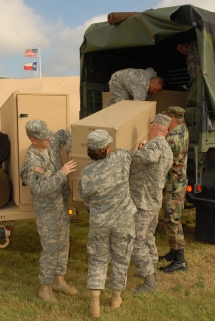Guard helping Texans hit by Hurricane Dolly
Chief Master Sgt. Gonda Moncada
2008/07/24
 Members of the Texas Army and Air National Guard and Texas State Guard unload supplies to prepare for rescue and relief efforts in response to Hurricane Dolly next to the Emergency Operations Center at Brooks City-Base in San Antonio, Texas July 23. Photo by Air Force Tech. Sgt. Elisabeth A. Matulewicz
Members of the Texas Army and Air National Guard and Texas State Guard unload supplies to prepare for rescue and relief efforts in response to Hurricane Dolly next to the Emergency Operations Center at Brooks City-Base in San Antonio, Texas July 23. Photo by Air Force Tech. Sgt. Elisabeth A. Matulewicz
CAMP MABRY, Texas (Army News Service, July 24, 2008) - Hurricane Dolly hit the Texas coast Wednesday with devastating winds and torrential rain, prompting Gov. Rick Perry to declare several southern counties disaster areas and call out the National Guard.
Currently 700 Texas military forces are activated in support of civil authorities, but that number may increase to 1,200 if necessary, officials said.
Lt. Gen Charles Rodriguez, Texas adjutant general, said the troops will ensure “stuff gets to the people who need it, and get people where they need to be.”
Military personnel are spread out across Texas from Austin to Brownsville and places in between. The teams are focused initially on establishing mass care strike teams, officials said. They explained that the teams will go out into areas hit by the hurricane and look for folks who might need safe passage or re-supply those who are sheltering in place. Eventually these same teams will establish stationary points of distribution, officials said, and typically co-locate with FEMA.
Local incident commanders will dictate as to what type of support Texas military forces will provide, but typically personnel support Red Cross with shelter management, perform search and rescue missions with Texas Task Force One, and provide communications support with “Big Blue,” a full communications package on wheels. Other satellite equipment has also been deployed.
Three shelters in Brownsville, Texas, have been staffed and are now operational at Hana High School, Porter High School and Pace High School. Shelters have also been established in the Texas communities of San Benito, La Joya, Raymondville, Edcouch, Harlingen, and Edinburgh.
Search and rescue teams are standing by in Kingsville with about 225 personnel and 75 high-profile vehicles and a ground transportation company. Personnel and equipment will move into the affected areas as soon as it is safe for people and equipment, officials said.
Aviation is standing by with three UH-60 Black Hawks in Austin and two in San Antonio as well as one OH-58. Under the Emergency Management Assistant Compact agreements signed between governors, the Louisiana Army National Guard has flown in a couple of Black Hawks to assist where necessary.
If and when the Texas Army National Guard helicopters are called to conduct search and rescue missions, they will not only have the Guard aviators and crew aboard, but Texas Task Force 1 members as well.
Marking its 10th anniversary last year, Texas Task Force 1 was established after the Oklahoma City bombing of the Murrah Federal Building, which officials said demonstrated a need for search and rescue team that is “wheels up” or at the point of departure within four hours.
Depending on who calls them into action, the team may be either a state or federal asset and its sponsoring agency is Texas A & M University.
D.J. Walker and Craig Smith, emergency medical technicians for the Austin fire department, and Dennis Lavasseur, an EMT from the Houston fire department, are on “Dolly detail.” They are swift-water rescue-qualified and will support the Texas Army National Guard crews during search and rescue missions .
Each team member’s ID card contains information on their expertise, said Craig, and after logging in, “the system will respond with information: `there are vacancies for you, can you respond?’”
“We are usually called up for a month at a time,” he said. For employers, “it is a win-win situation because the day-to-day employer gains back a fully qualified and trained employee,” after all is said and done.
click to read more...